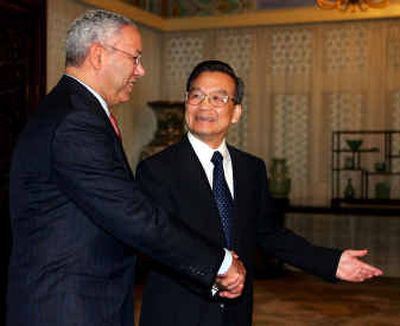China agrees to human rights talks

BEIJING – Secretary of State Colin Powell won agreement from top Chinese officials Monday to resume joint discussions on human rights issues, but he failed to persuade them to open a dialogue with old rival Taiwan.
China angrily removed human rights from the U.S.-China agenda last spring when the United States introduced a resolution critical of Beijing before the U.N. Human Rights Commission in Geneva.
Powell told reporters after high-level discussions here that the two countries “will start talks about resuming our human rights dialogue.” He said he wants official discussions to touch on U.S. concerns about the detention of journalists and restrictions on civil liberties, among other issues.
On Taiwan, Powell reaffirmed the U.S. view that China should welcome a recent offer by Taiwanese President Chen Shui-bian to reopen political discussions with China. But the Chinese, mistrustful of Chen because of his moves toward independence, rejected Powell’s appeals, said a U.S. official who accompanied Powell in the discussions.
China has said a dialogue with Taiwan will be possible only after the island agrees it is a part of China.
Powell, who arrived here from Japan on Sunday night, met separately with President Hu Jintao, Prime Minister Wen Jiabao and Foreign Minister Li Zhaoxing.
The Xinhua News Agency reported after Powell’s talks that Hu “appreciated” the United States for reiterating its opposition to Taiwan independence.
“(Hu) said he hoped the U.S. side would see clearly the nature and serious harm of the ‘Taiwan independence’ forces,” Xinhua said.
During Powell’s discussions, China reaffirmed its strong opposition to U.S. arms sales to Taiwan. Powell said all weapons transfers to the island are for defensive purposes only.
There was no shortage of issues for the two sides to discuss. A Powell aide counted 29 raised during his meetings.
He flew to South Korea in the afternoon following a 25-minute stop at the Sun Dong An Plaza, a modern shopping mall in the heart of Beijing. As he arrived, he was surrounded by a phalanx of about two dozen plainclothes police who kept surprised Chinese shoppers at bay. Some snapped pictures of him with their cell phones. He bought an $8 art set for one of his grandchildren and a $10 fountain pen.
On North Korea, Chinese officials told Powell they believe it is possible for six-nation negotiations on nuclear disarmament to resume in the next few months. North Korea boycotted a meeting that was to have taken place in September. The six nations are the United States, China, Japan, Russia and the two Koreas.
The United States is seeking the permanent denuclearization of North Korea and has said it will provide the communist government with economic benefits only after it offers a credible commitment to meet U.S. disarmament demands.
American partners in the six-party process share the U.S. goal but Li, the Chinese foreign minister, told Xinhua after his meeting with Powell that he believes that U.S. policy is too rigid. Washington, he said, should “go further to adopt a flexible and practical attitude on the issue.”
The North Korea question was expected to dominate Powell’s discussions in South Korea, which is part of the six-party negotiation.
Powell planned a meeting this morning with President Roh Moo-Hyun, whose policy of reaching out to North Korea contrasts sharply with the more confrontational U.S. approach.